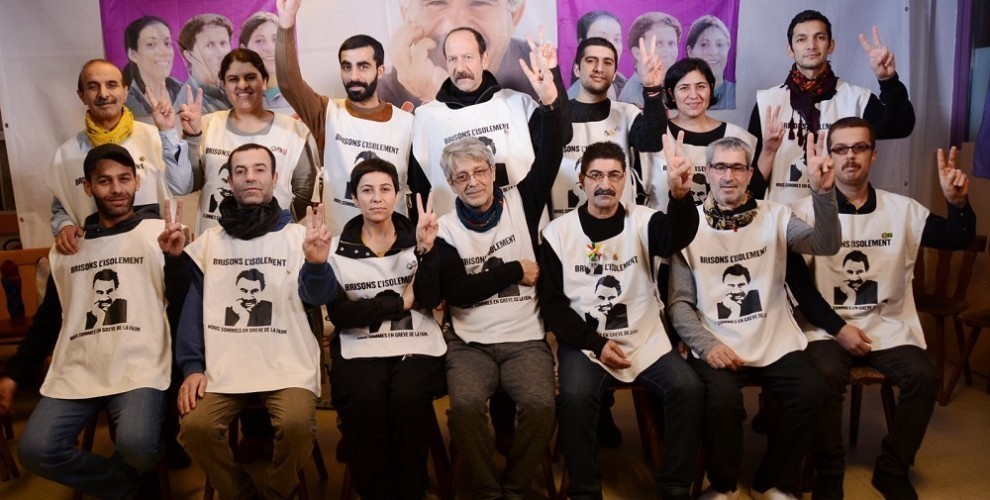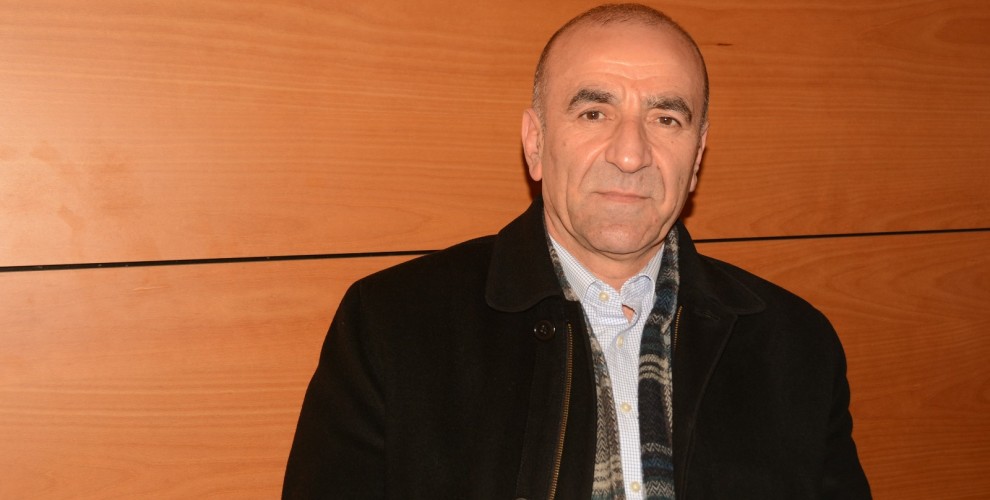Diplomatic activity grows as Strasbourg fast reached day 85
The hunger strikes are a non-violent resistance although often some European countries have borrowed from Turkey the same ‘terror-violence’ discourse when it comes to talk about Kurds.
The hunger strikes are a non-violent resistance although often some European countries have borrowed from Turkey the same ‘terror-violence’ discourse when it comes to talk about Kurds.

In parallel with the indefinite hunger strike launched in Strasbourg on 17 December 2018 against the isolation of Kurdish People's Leader Abdullah Öcalan, an intense diplomacy activity is being carried out before the Council of Europe and the European Parliament.
Especially important has been the ruling of the European Council calling on Turkey to lift isolation as well as the CPT remarks.
It is accepted that the spreading of the hunger strike resistance of the Kurds in the diaspora will have a significant impact on these institutions and European countries.
The hunger strikes are a non-violent resistance although often some European countries have borrowed from Turkey the same ‘terror-violence’ discourse when it comes to talk about Kurds.
In addition, since the CPT is connected to the Council of Europe as to its institutional functioning, the attitude of the European Council and indirectly the European Union and Parliament should be taken into account when analysing the CPT remarks.
ANF spoke to the HDP representative in Europe, Fayik Yağızay who has been for many years involved in diplomatic relations with the Council of Europe, the European Parliament and the Committee for the Prevention of Torture (CPT).
Yağızay confirmed that as soon as the hunger strike resistance began the decision was made to carry out intense diplomatic work as well as press work.

Important decisions by the PACE and European Parliament
As a result of this work, Yağızay noted that a certain sensitivity was created like for example during the sessions of the Parliamentary Assembly of Council of Europe (PACE) in January. He reminded that dozens of parliamentarians organized actions to end isolation and in support of DTK co-chair and HDP Hakkari MP Leyla Güven in both the PACE meetings and the European Parliament Strasbourg sessions in January and February.
In the sessions of PACE and the European Parliament, said Yağızay, the issues of hunger strike resistance and isolation have been raised many times and the presidents of the two institutions and the European Union's Foreign Affairs Commissioner Federica Mogherini wrote letters.
Yağızay said that perhaps the most important development was the urgent motion tabled at the PACE January session related to Turkey.
Meetings with European institutions
Yağızay, who reminded that this is the first time that the name of Öcalan was mentioned in a resolution, underlined that the motion explicitly asked Turkey to implement the recommendations contained in the CPT reports in accordance with the European Court of Human Rights.
"In the event that this decision is not implemented the Committee of Ministers will act,” said Yağızay who added: “We also held many meetings to monitor the implementation of this decision. We met with the Secretary General of the Council of Europe, PACE President, Secretary General of the Committee of Ministers, Heads of some groups, and a number of authorities such as the Political and Legal Committee.”
In all these meetings, said Yağızay, “we demanded the implementation of the Council of Europe decision. The fact that a parliamentarian, Leyla Güven, who was at that time in prison, meant we also demanded to urge Turkey to comply with the agreements it had signed. In other words, in case of compliance with these agreements, the removal of isolation would actually take place automatically.”
Turkey tried to break the resistance
Turkey, continued Yağızay, tried to break the resistance by allowing a short visit to Mehmet Öcalan and by releasing Leyla Güven. It tried this to prevent the growth of the international sensitivity and solidarity.
“Indeed, - said Yağızay - some parliamentarians who promoted the decision in the PACE, thought that with the release of Leyla the hunger strike will end. But we pointed out to them that Leyla had not actually gone on hunger strike demanding her own release. She was demanding the end of isolation.”
Reminding the importance of peace negotiations involving the Kurdish People's Leader, Yağızay reminded that what Leyla Güven and other hunger strikers are demanding is precisely the restoration of that negotiation environment.
Yağızay confirmed that the diplomatic activity continues to be a top priority at both national and European parliamentary level at the time when the resistance has reached the 85th day.
No news from the CPT
The CPT recently rejected applications by members of the Diagonal Diaspora Assembly and activists of the hunger strike.
The HDP Representative in Europe reminded that the CPT rejected a request for meeting made by the Shengal Diaspora Council and hunger strikers in Strasbourg.
“We had some talks when the hunger strike began - he said - but the answer we got from the CPT was that ‘we are at the same point’. Basically the CPT said that they are maintaining talks with Turkey therefore there is no need to repeat the same things.”
Emphasizing that the attitude of the CPT is absolutely unsatisfactory, Yağızay stressed that the CPT could actually do a lot as it is the only institution authorized to visit the prisons. Yağızay confirmed that despite the negative, talks with the European Council and the CPT will continue.
Yağızay said they hope the European institutions would take a step before the 31 local elections in Turkey, but this appears difficult, although he confirmed that these institutions are looking for a solution.
It is necessary to show Europe the real face of Turkey
Stressing the importance of mass activities and the strength of the Kurdish people of Europe, Yağızay said that Europe cannot remain silent about these peaceful actions.
Yağızay called on the Kurdish people in Europe to continue these peaceful actions to win over the European public opinion and institutions.
HDP representative underlined that despite the massacres carried out by Turkey and despite the serious human rights violations European governments maintain their economic, political and commercial relation with Turkey. It is a responsibility of Kurds, he added, to prove Europe wrong in its attitude towards Turkey.
Yağızay ended this conversation by confirming that a number of meetings are planned for the next week, both in the Council of Europe and the European Parliament. The latter should also release its report on Turkey at some stage this week.